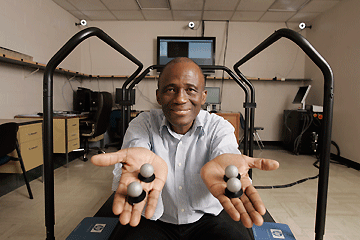Students, Professor Recognized for Research
April 02, 2009

Two students and two professors from The University of Texas at El Paso have been recognized for their research in the area of Human Motion Analysis and Neurorehabilitation.
Dr. Thompson Sarkodie-Gyan, Professor of Electrical Engineering at UTEP and Director of the Laboratory for Human Motion Analysis, recently developed a new technology that will help patients with neurological problems learn to walk again.
Sarkodie’s research, which promises to revolutionize the way therapy is given to neurologically impaired patients, has made him a leader in the field, with his work recognized by the world community.
He will present his research at the 2009 IEEE 11th International Conference on Rehabilitation Robotics (ICORR 2009) in Kyoto Japan, June 23-26, 2009. A forum for those heavily engaged in rehabilitation technologies, ICORR 2009 will bring together the best in the area of Human Motion Analysis and Neurorehabilitation.
In addition to serving as organizing chair of the session of Robotics for Human Motion Analysis and member of the Scientific Program Committee, he will also chair various sub-sessions and will serve as Associate Editor for the special proceedings of the conference.
UTEP master’s student John Kweku Avor and PhD student Huiying Yu will also present papers on their research in the field, along with Dr. Jody Riskowski, Assistant Professor of Kinesiology in the College of Health Sciences. Dr. Richard Brower, MD, an Associate Professor of Neurology at Texas Tech University will also attend the conference. Riskowski and Brower both serve as Co-Director’s of UTEP’s Lab for Human Motion Analysis and Neurorehabilitation.
“The best in the world will present their current innovations and inventions,” said Sarkodie. “Even the mere fact that one’s paper is accepted to the conference is a very great thing. It is a very specialized conference and only papers that depict innovation and novelty are accepted. Hence, paper acceptance is extremely difficult and competitive.”
The papers that UTEP will present at the conference are based on research performed in UTEP’s Laboratory for Human Motion Analysis and Neurorehabilitation.
“My students and I will have the unique opportunity to meet the best people working in the field,” said Sarkodie. “We will have the opportunity to share our research and to also learn from others all over the world. This is especially significant to students because it helps them to realize that the research they are doing is among the best in the world.”
For more information about the UTEP College of Engineering or the Laboratory for Human Motion Analysis and Neurorehabilitation visit http://engineering.utep.edu.




